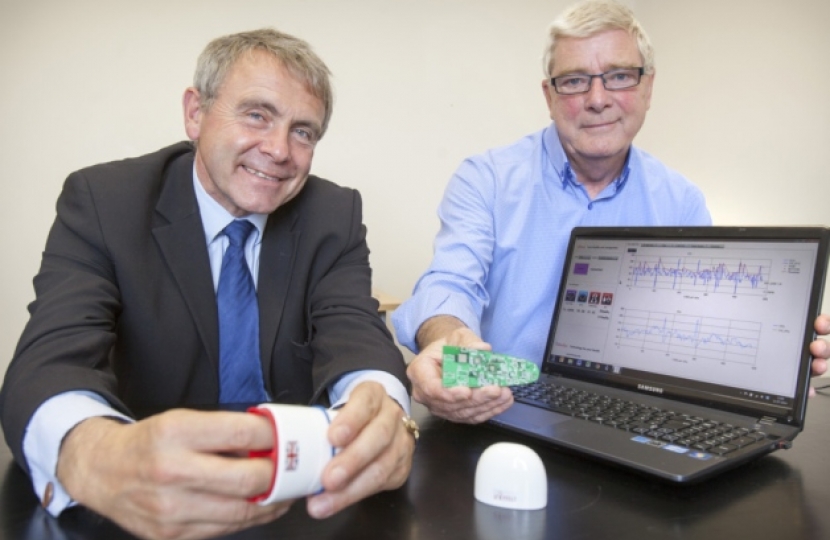
On Friday, Graham Priestley invited Whitby MP Robert Goodwill to Staithes Gateway Business Centre, where he showcased his latest invention - called Eimo.
Staithes may not be the most obvious location for the development of state-of-the-art healthcare and artificial intelligence, but it is the headquarters of life science company Imonsys.
Managing director Graham Priestley has lived in Hinderwell for 30 years and is supported by Teesside University graduate Billy Atkinson, a talented computer games programmer from Loftus.
“Eimo is an instant vital sign monitor that even Granny can use,” explained Graham.
The wireless device stores data such as heart rate, temperature, and other vital statistics, which can be potentially life-saving if an irregularity is spotted.
Data could be stored for an upcoming appointment, or it can be sent straight to a doctor for analysis.
This would prevent that all-too-familiar annoyance whereby a patient may have a “funny turn”, and book an appointment to see their doctor. However, by the time the appointment comes around, the problem may have cleared up. Where this health issue is recurring, it could become potentially dangerous, but Eimo collects data instantly and allows it to be analysed at a later appointment.
Regular monitoring allows doctors to keep track of patients who have recently been released from hospital.
Another usage would spare chemotherapy patients the pain and discomfort of making a trip to hospital every week for tests as they would instead be able to send their vital readings over the internet.
Graham set up the company in 2008, working alongside the Ministry of Defence to create a device that would monitor a soldier’s vital signs, like a black box in an aeroplane.
However, his funding was cut and the project shelved for two years, until it was resurrected with the assistance of the University of Hull.
“The idea was embedded in my head,” said Graham.
To develop Eimo, Graham even enlisted the help of local GPs, with Staithes Surgery’s Dr Graham Croft providing a professional input.
Since then he has sought to submit the gadget for clinical trials and has applied for funding for the product, but has so far been unsuccessful.
“How frustrating that in the home of entrepreneurs, we can’t get funding for this,” he said.
So last Friday Graham invited Whitby MP Robert Goodwill into the office to take a look at the proposal.
Suitably impressed by the potential applications of the device, Mr Goodwill said: “I think this has tremendous potential for home diagnostics, particularly where people have an intermittent heart condition such as heart palpitations.”
Mr Goodwill promised to write to National Institute of Health and Clinical Excellence to ask them to explore how the device can be developed within the NHS.
Mr Goodwill added: “We are increasingly seeing technology being developed to help doctors and this product is at the cutting edge of that movement. “I never fail to be surprised by the invention that is shown by local businesses around Whitby.”
